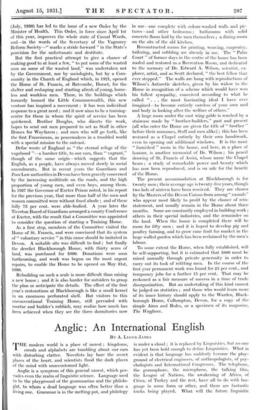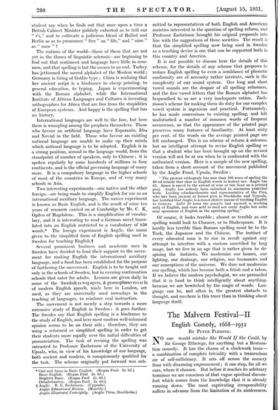Anglic : An International English
BY A. LLOYD JAMES THE modern world is a place of unrest ; kingdoms, creeds and alphabets are tumbling about our ears with disturbing clatter. Novelists lay bare the secret places of the heart, and scientists flood the dark places of the mind with unaccustomed light.
Anglic is a symptom of this general unrest, which per- vades even the realm of linguistic science. Language used to be the playground of the grammarian and the philolo- gist, to whom a dead language was often better than a living one. Grammar is in the melting-pot, and philology is under a cloud ; it is replaced by Linguistics, but no one has yet been bold enough to define Linguistics. What is evident is that language has suddenly become the play- ground of electrical engineers, of anthropologists, of psy- chologists and International Congresses. The telephone, the gramophone, the microphone, the talking film, the League of Nations, the awakening of Africa, of China, of Turkey and the rest, have all to do with lan- guage in some form or other, and there arc fantastic tricks being played. What will the future linguistic student say when he finds out that once upon a time a British Cabinet Minister publicly exhorted us to trill our " r's," and to cultivate a judicious blend of Balliol and Berlin so as to pronounce " five " as "fife," and " nine " as " nane " ?
The nations of the world—those of them that are not yet in the throes of linguistic sclerosis—are beginning to find out that sentiment and language have little in com- mon, and that spelling is but the means to an end. Turkey has jettisoned the sacred alphabet of the Moslem world ; Germany is tiring of Gothic type ; China is realizing that her ancient script is a hindrance to cheap printing, to general education, to typing. Japan is experimenting with the Roman alphabet, while the International Institute of African Languages and Cultures is inventing orthographies for Africa that are free from the stupidities of European systems. And happy is the spelling that has no history.
International languages are well to the fore, but here there is wrangling among the prophets themselves. Those who favour an artificial language have Esperanto, Ido, and Novial in the field. Those who favour an existing national language are unable to make up their minds which national language is to be adopted. English is in a strong position, second in the language world, from the standpoint of number of speakers, only to Chinese ; it is spoken regularly by some hundreds of millions in four continents, and is the official governing language of many more. It is a compulsory language in the higher schools of most of the countries in Europe, and of very many schools in Asia.
Two interesting experiments—one native and the other foreign—are being made to simplify English for use as an international auxiliary language. The native experiment is known as Basic English, and is the result of some ten years of research carried on at Cambridge by Mr. C. K. Ogden of Magdalene. This is a simplification of vocabu- lary, and it is interesting to read a German novel trans- lated into an English restricted to a vocabulary of 850 words.* The foreign experiment is Angrre, the name given to the simplified form of English spelling used in Sweden for teaching English.f Several prominent business and academic men in Sweden have decided to lend their support to the move- ment for making English the international auxiliary language, and a fund has been established for the purpose of furthering the movement. English is to be taught not only in the schools of Sweden, but in evening continuation schools that cater for adults. Lessons are given daily in some of the Swedish nevi spapers, & gramophone recoris of modern English speech, made here in London, are used, as they are universally used nowadays in the teaching of languages, to reinforce oral instruction.
The movement is not merely a step towards a more extensive study of English in Sweden ; it goes further. The Swedes say that English spelling is a hindrance to the study of English, and here most modern well-informed opinion seems to be on their side ; therefore, they are using a reformed or simplified spelling in order to get their students more rapidly over the initial difficulties of pronunciation. The task of revising the spelling was entrusted to Professor Zachrisson of the University of Upsala, who, in view of his knowledge of our language, both ancient and modern, is conspicuously qualified for the task. The scheme originally put forward was sub-
• Carl and Anna in Basic English. (Kogan Paul. 2s. 6d.) Basic English. (Kegan Paul 2s. 6d.) Brighter Basic. (Kegan Paul 2s. 6d.) Debabelisation. (Kegan Paul 2s. 6d.) t Anglic. R. E. Zachrisson. (Uppsala). Anglic Educational Review. (Monthly.) Anglia Illustrated Fortnightly. (Anglic Press, Stockholm.)
mitted to representatives of both English and American societies interested in the question of spelling reform, and Professor Zachrisson brought his original proposals into line with the suggestions of these societies. The result is that the simplified spelling now being used in Sweden as a teaching device is one that can be supported both in this country and America.
It is not possible to discuss here the details of this scheme, for the details of any scheme that proposes to reduce English spelling to even a semblance of phonetic conformity are of necessity rather intricate, such is the complexity of our sound system. Our long and short vowel sounds are the despair of all spelling reformers, and the five vowel letters that the Roman alphabet has bequeathed to us are a very inadequate ration. Zach- risson's scheme for making them do duty for our complex vowel system is ingenious and practical. Fortunately, he has made concessions to existing spelling, and left undisturbed a number of common words of frequent occurrence, so that the appearance of the printed page preserves many features of familiarity. At least sixty per cent. of the words on the average printed page are left unchanged. This is no scheme of reform a out rance, but an intelligent attempt to revise English spelling so that a student who has been brought up on the revised version will not be at sea when he is confronted with the authorized version. Here is a sample of the new spelling, taken from a short account of the movement published by the Anglic Fund, Upsala, Sweden : "The prezent orthografy has mor than 500 waez of speling the 40 od soundz that okur in English wurdz in kurent ues. Anglic has 65. Spaes is saevd to the extent of wun or tnu lienz on a printed paej. Anglia has aulredy been submited to nuemerus praktikal tests. Leeding eduekaeshonists and reprezentativz of the Pres, who hay been prezent at korsez giyn in Stockholm and Uppsala, hay testified that Anglic is a moest efektiv meenz of teeching English to forinerz. Aaftr 20 lesnz the puepilz had aquierd a wurking nolij of English, and were aebl to reed not oenly Anglic but aulso eezy spesimenz of English in the egzisting speling."
Of course, it looks terrible ; almost as terrible as our spelling would look to Chaucer, or to Shakespeare. It is hardly less terrible than Roman spelling must be to the Turk, the Japanese and the Chinese. The instinct of every educated man is to rise in revolt against any attempt to interfere with a custom sanctified by long usage, but we live in an age that is rather given to de- spising the instincts. We modernize our houses, our lighting, our drainage, our religion, our harmonies and. our conceptions of the universe. We dare not modernize our spelling, which has become both a fetish and a taboo. If we believe the modern psychologist, we are persuaded that it is hard to think intelligently about anything, because we are bewitched by the magic of words. Lan- guage can be, imd often is, the greatest obstacle to thought, and nowhere is this truer than in thinking about language itself.































 Previous page
Previous page